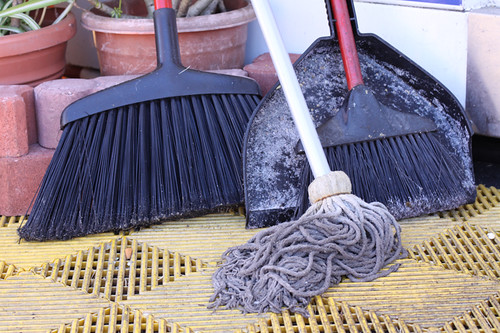Despite the relative simplicity of his presentation, Elbow's thoughts are proving to be immensely important to my overall research ideas. His discussion of the believing game and the doubting game and the importance of metaphor in developing new ideas are proving to be fertile ground for connections (as I wrote about here.)
But today I want to step outside of the academic and talk about how Peter Elbow has helped me in an area in which he probably had no intention of helping when he wrote his book: housekeeping.
Regular readers of this blog will find it no surprise when I tell you that housekeeping is the bane of my otherwise pretty well managed balancing act. (I even wrote about it through an academic lens when I was reading Patricia Roberts-Miller's Deliberate Conflict). Elsewhere, I've mused about everything from the cultural impact of our gendered narratives on housekeeping to the quite desperate plea of trying to figure out the secret.
In Writing Without Teachers, Elbow calls for a very practical practice of freewriting. He insists that aspiring writers make themselves get up every morning and write without stopping for a short period of time, say ten minutes. They can write about anything they want. The results will likely be a mess. Most of what they write will not make it into a final draft--or any draft at all. The important thing, Elbow insists, is that they do it: just write.
I have no trouble making myself write. In fact, I am often writing when I'm supposed to be doing other things (there's a basket of laundry to be folded calling my name right this second).
There are times when I will wake up in the middle of the night and need to write. I've learned to stop fighting it. If I get back into bed and force myself to close my eyes, I will toss and turn for hours, arising unsatisfied on all accounts: physically and emotionally. If I just get out of bed and write, I can go back to sleep.
I have never awoken in the middle of the night and needed to clean. Sure, I've had a bout of insomnia that I used to get some cleaning done, but the urgency to clean was never the catalyst.
But Elbow isn't talking to people who awake in the middle of the night with their fingers itching for prose. He's talking to people who want the finished product of the work we put into writing but who don't necessarily love the process. He's talking to people who are like me--when it comes to cleaning.
It was the advice of the profanely-named Unfuck Your Habitat that made the connection for me. It's a website for people who hate to clean, and it provides tips and motivation. Their primary model of cleaning involves breaking down all of the work into bite-sized chunks, the 20/10 being the most common (20 minutes of cleaning followed by a 10 minute break followed by another 20/10 until you are done.)
Elbow suggests something similar with freewriting. Force yourself to do a 10 minute freewrite, re-read what you wrote. Circle what's worthwhile; then do a 10 minute freewrite on that thing. Re-read that and circle what's worthwhile. Do another 10 minute freewrite. In this way, you'll whittle down the clutter in your mind to get to what you really want to write about.
In this way, I whittle down the literal clutter of my house and get to a home I can stand living within.
Peter Elbow says that we should arise each morning and force ourselves to write. It's just 10 minutes. Likewise, I now set a timer and force myself to clean each evening. It's just 15 minutes.
I never would have thought that 15 minutes would make a difference, but it does. In five minutes, the toys and books are put away. In 10 minutes, the dishwasher is unloaded and loaded, leaving me a sink that I can see. In 15 minutes, the kitchen is swept. If my husband and I do it together (and we usually do), we can get a load of laundry and a quick wipe down of the bathroom in there, too. 15 minutes. There are days when I can't do much, but there's never a day when I can't give 15 minutes.
So, there you have it, study for your PhD, and you'll find all kinds of helpful life lessons. (Or, perhaps more accurately, study for your PhD, and you'll be so desperate for justifiable procrastination that cleaning your house starts to look appealing.)
Photo: Jessica Lucia, Natalie Bowers



I am the same way with cleaning...it is the only thing I cannot manage to get a handle on. I am going to try this idea!
ReplyDeleteIsn't it maddening how hard something so seemingly simple can be? Let me know if it works!
ReplyDelete